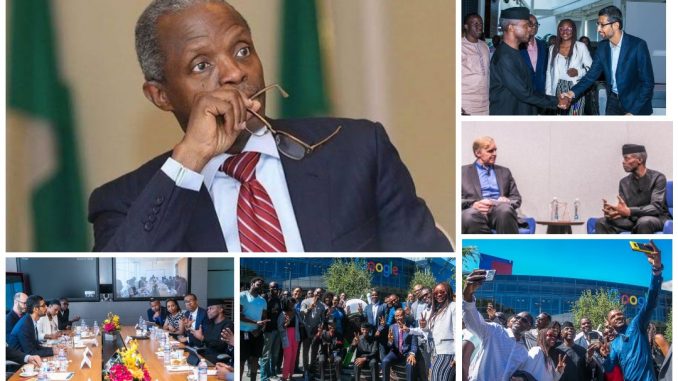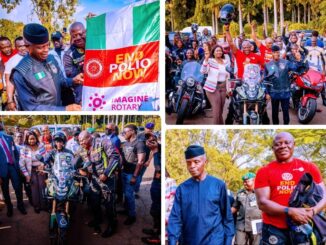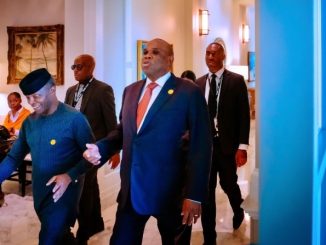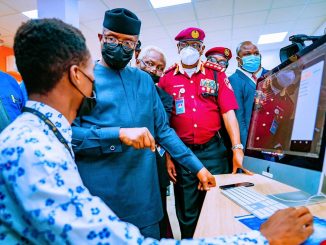
For me and everyone following recent developments, beyond the Twitter ban, looking at the appreciable growth of the industry in Nigeria viz-à-viz a tie established between the Silicon Valley and Nigeria very keenly, we would indeed agree that Vice President Yemi Osinbajo is a recurring decimal when making relative allusion as far as technological revolution aiding youth empowerment and opening of business spaces is concerned in Nigeria, among other salient contributions of the Vice President to national growth. So, with the foundational goodwill, irrespective of what happens now to Twitter, it can only end favourably for Nigeria and the citizenry, writes KEHINDE ADEOYE.
The advent of technology has no doubt improved the status quo of the black continent, Africa. We may have been plagued in the past by stunted socio-economic and political growth, but without mincing words, we can conclude that technology has done to us a whole lot of good.
Nigeria, being the world’s most populous black nation and of course, the giant of Africa, as widely said, is not excluded in this stride. In fact, we are unarguably one of the counties with the biggest connects when it comes to partnership with tech giants in recent times.
For me and for everyone who has followed the recent developments regarding silicon Valley and Nigeria very keenly, we would indeed agree that Vice President Yemi Osinbajo cannot be left out when making relative allusion.
In July 2018, Osinbajo went on a tour to the Silicon Valley on a collaborative investment drive with some members of the Presidential Advisory Group on Technology and Creativity, where he visited the mountain view, Carlifonia at Googleplex; the coperate headquarters of Google and Alphabet Inc.
Silicon Valley, in the southern San Francisco Bay Area of California, is home to many start-up and global technology companies. Apple, Facebook and Google are among the most prominent. It’s also the site of technology-focused institutions centered around Palo Alto’s Stanford University. The Computer History Museum and NASA’s Ames Research Center are in Mountain View. The Tech Museum of Innovation is in San Jose.
The Vice President’s visit was strictly about the opportunities that abound in Nigeria’s digital economy. We would recall that Google has a massive digital skill acquisition in Nigeria and Africa.
Speaking about the progress made after the return from Silicon Valley, Osinbajo, in a Fire Side Chat with Nick Clegg, Facebook VP of Policy and Communication, a former Deputy Prime Minister of the United Kingdom, explained the strong partnership that already existed between some tech firms and some Nigerian start-ups.
Osinbajo said: “Both tours were extremely successful. At the Silicon Valley, Nigerian start-ups got a chance to pitch their products to tech sector investors, that was very good, in fact, before we left Silicon Valley, one of our venture platforms was able to sign a deal of about $10 million with the Nigerian US Council, even before we left.”
He stressed further: “Since then, we have seen tremendous activities post-trip. We were also at the Facebook campus, which was an absolute delight, we enjoyed being around there, seeing the excitement and a great deal of energy that was encouraging for many start- ups, seeing at close quarters what a comparable giant was doing, and I think this was very helpful.”
ALSO READ: Osinbajo’s integrity and the rest of them
Besides, Osinbajo, representing the government had established relationships with Microsoft to further expand its investments in Nigeria. A testament to the success recorded here was the recent joint announcement with the Government of Nigeria, where Microsoft detailed several projects aimed at intensifying the nation’s move to become a more digital economy. In this arrangement, five million Nigeria youths will participate in full capacity development programmes to make them gainfully engaged.
In this extensive consultations with government, Microsoft had identified three key pillars that will help to build strong foundations for a digital economy in Nigeria viz-à-viz connectivity, skilling and digital transformation.
“We believe in the future of Nigeria, and we are excited as a company to add to our investments. Together, we have an enormous opportunity to put technology to work, create jobs, to foster the technology ecosystem across Nigeria, and to use technology to preserve the best of the past and take us into the future,” says Brad Smith, Microsoft President.
From the progress made already, six regions in Nigeria have been earmarked for the development of high-speed internet infrastructure. Microsoft’s Airband team will work closely with local partners to improve broadband connectivity in these communities while also assisting with the design and implementation of hyper-scale cloud services.
ALSO READ: Why Nigerian youths won’t forget VP Yemi Osinbajo
Since technological infrastructure alone is not enough to ensure sustainable digital transformation yet, it is for this reason Microsoft is committing to upskilling five million people in Nigeria over the next three years. To help reach this goal, 1,700 trainers will provide blended online and in-person training courses to the country’s youth as well as government workers. Government will also be given the tools to digitally transform skilling, education, and employment methods to match job seekers with the right employers. In doing so, we hope to create over 27,000 new digital jobs in the next three years.
“We are setting ourselves a big goal, to bring access to digital skills to five million people in Nigeria over the next three years. But this is not something we can do by ourselves. We will equip master trainers and, along with them, are committed to creating thousands of new jobs,” Smith said.
The final pillar, digital transformation, will initially be made up of two initiatives. The first will address corruption, a major global challenge with economic losses totalling $3.6 trillion each year. By collaborating with local partners, Microsoft will support the design and implementation of cloud-based tools to further enable government’s fight against corruption. Microsoft will be partnering with the Economic and Financial Crimes Commission to apply technologies like artificial intelligence and machine learning to help identify potential risk, highlight them, and reduce corruption.
The second initiative will help protect Nigeria’s rich cultural heritage, as Microsoft will look to deploy artificial intelligence tools to safeguard these treasures for future generations. Through a newly formed partnership with the National Institute of Cultural Orientation, Microsoft will support the organisation’s efforts to preserve and revive Nigeria’s three major indigenous languages: Hausa, Yoruba, and Igbo.
“This is one of my favourite projects that we pursue around the world. It uses the most advanced technology of the 21st century to nurture and keep alive the culture that has been so important for humanity from the centuries past,” Microsoft CEO Smith said.
The above attests to the fact that the tech sector has enjoyed a strong working relationship with Nigeria possibly ahead of other African countries over the years. That is why the present situation especially with Twitter should not be seen as a witch-hunt, but means to create a better working environment, with has to be done for a successful and proper integration of all these initiatives in the system.
So, while we applaud the commitment the Nigeria government has shown towards the growth of tech in the country, we equally need to understand that both parties (Nigeria and tech giants) must arrive at a united position to allow for a stronger working relationship as stated earlier.
One of the problems most countries have faced over the years is the lack of genuine understanding with social media operators such as Facebook and Twitter, among others. These medium connects people, the world, thoughts and insights, but overtime, it has equally been a tool for propagandists and mischief makers together with those who exploit the platforms for cyberbullying, identity theft, inciting of violence, propagating tribal and religious hate and so on.
Just recently, a former US President, Donald J. Trump, who used to be a prolific user of Twitter, got permanently suspended. Twitter policy team envisaged his activities could ruin the US democratic system believed to be one of the world’s developed democracies where third parties have the least political influence.
During the election that subsequently enthroned current President Joe Biden and Trump’s impeachment process, he exhibited acts that were unpresidential. Acts that included fake news circulation, threat to democracy and inciting his loyalists in a bid to stop the impeachment process at the US Capitol which seemed to be the melting point.
At the time, the decision by Twitter to suspend his account came as a shock to many, probably because he was the most powerful man in the world at the time. But events now appear to have changed when it comes to engaging matters of policy in other counties like Nigeria and India, where fugitives now use the social media platforms for means of inciting violence and preaching of hate against government, tribe and religion.
Nigeria has been continually faced with a lot of security challenges almost in every region. The most prolific being the Boko Haram, the bandits and Nnadmi Kanu’s Indigenous People of Biafra (IPOB). It grew worse around the month of May with several cases of abduction in primary schools and tertiary institutions, destruction of public properties and killings of targeted political figures.
The Independent National Electoral Commission (INEC) was one of the bodies that saw some of its properties destroyed, as officials in a meeting, had reported the attacks to President Buhari.
It was in reacting to this dastard act and many attacks of IPOB members against the Nigerian state’s facilities and causing of deaths of innocent Nigerians that the President tweeted: “Many of those misbehaving today are too young to be aware of the destruction and loss of lives that occurred during the Nigeria Civil War. Those of us in the fields for 30 months, who went through the war, will treat them in the language they understand.”
The tweet which had been deleted since by Twitter, who claimed it violated its policy generated a lot of controversy in the country. The tweet signalled perpetrators of evil of an impending clampdown, but some Nigerians believed that tweet was uncouth.
However, in a retaliatory move, on the 5th of June, the Nigerian government, represented by the Minister of Information and Culture, Lai Mohammed, announced the suspension of Twitter’s operations in Nigeria, via a statement issued and signed by Segun Adeyemi, the media aide to the Ministry of Information and Culture.
The Minister was widely reported in the media, local and foreign, who said the “Federal Government has suspended indefinitely the operations of the microblogging and social networking service Twitter in Nigeria,” quoting the Minister of Information and Culture, Alhaji Lai Mohammed, as announcing the suspension in a statement issued in Abuja on Friday, citing the presistent use of the platform for activities that are capable of undermining Nigeria’s corporate existence.
The Minister said the Federal Government had also directed the National Broadcasting Commission (NBC) to immediately commence the process of licensing all OTT and social media operations in Nigeria.
The Minister, who also questioned the platforms intent, said: “Twitter may have its own rules; it’s not the universal rule. If Mr President anywhere in the world feels very bad and concerned about a situation, he is free to express such views… The mission of Twitter in Nigeria is very, very suspect.”
The information minster, Lai Mohammed accused Twitter of double standard alluding to Nnamdi Kanu’s numerous violent tweet left undeleted.
“The mission of Twitter in Nigeria is very, very suspect. Has Twitter deleted the violent tweets that Nnamdi Kanu has been sending,” Kanu is the leader of IPOB. He lives in exile in Israel. When people were burning police stations and killing police officers during #EndSARS, for Twitter, it was about the right to protest. But when a similar thing happened on the Capitol, it was insurrection,” the Minister said.
Twitter reacted to the ban: “We are deeply concerned by the blocking of Twitter in Nigeria. Access to the free and #OpenInternet is an essential human right in modern society. We will work to restore access for all those in Nigeria who rely on Twitter to communicate and connect with the world.”
After the back and forth, Twitter wrote the Federal Government seeking for engagement. The Nigerian government announced to set up a committee to negotiate with Twitter a few weeks after the government ban. The committee includes five serving ministers of the Nigerian government.
While insisting on the regulation and registration of social media platforms, Lai Mohammed pointed out that most of the over-the-top media service (OTT) and social media platforms operating in Nigeria do not have offices in the country or pay taxes for the billions earned in transacting their business.
Lai Mohammed said the Federal Government had resolved to ensure other social media platforms like Facebook and Instagram be registered in the country.
But before matters degenerated to this level, Prof Osinbajo, who has been an advocate of free speech had lent his voice to issues around the possible regulation of the social media, which he said may not be necessarily if cautions would be taken by users not to abuse it.
“In other words, shouldn’t we be looking at some kinds of conventions; some kind of agreements between countries, between nations that help us to regulate the social media much more effectively,’’ Osinbajo said as the call for it regulation was proposed by Lai Mohammed.
The Vice President further said: “I don’t think that government regulation is necessarily the way to go, but I believe that we as persons of faith and we, as leaders, and those of us who use the social media actively owe a responsibility to our society and to everyone else, to ensure that we don’t allow it to become an instrument of conflict and instrument of war.”
But having cautioned the populace against the abuse of social media, but which unfortunately was not heeded, especially by a section of Nigerian users defiant to government, majority of whom have even used the social media space as insurrectionists to launch secessionist agenda against the Nigerian state and its authorities, even causing deaths of innocent Nigerians, Osinbajo is now vindicated, as latest development justified government’s action.
Vice President Osinbajo had earlier warned that social media can precipitate war and violent conflict if used to misinform, while he also cautioned against using social media platforms to promote religious disinformation, which he said could easily lead to the breakdown of law and order.
While it should noted that, Twitter is not the only representation of social media in Nigeria, its action, the government said compromised the security and territorial integrity of Nigeria for allowing its medium be used by insurrectionists using the platform to mobilised attacks against government facilities and in the process, causing the death of innocent Nigerians, and while Twitter didn’t tamper with their foul tweets, it deleted President Buhari’s tweets cautioning rebels, claiming it violated its rules.
Now, if Prof Osinbajo is speaking on the angle of law to ensure balance in approach to social media operations in Nigeria, even in generating revenue for the country, as the current national economic situation warranted it, he is justified, still seeing things from the perspective of someone who believes in free speech, the motive is to ensure quick resolvent of the Twitter ban, as he is offering a possible way out of the quagmire. ,
Vice President Osinbajo, had said the Nigerian statues in Section 4 of the Finance Act 2019, provides that “the Minister (Finance) may by order (of the President) determine what constitutes the significant economic presence of a company other than a Nigerian company.”
Consequently, the Vice President interacting with a delegation of the Chartered Institute of Taxation of Nigeria (CITN), led by its President, Mr Adesina Adedayo, who visited him at the Presidential Villa on the June 25, said, “Nigeria will explore its legal provisions that empower the Federal Government to collect taxes on profits made in the country by global technology and digital firms not based in the country, but with significant economic presence.”
Osinbajo said: “We have also recently taken a step with respect to a lot of the technology companies that are not represented here but who do huge volumes of business here,” adding that the Finance Act has shown that we are very prepared to ensure that these big technology companies do not escape without paying their fair share of taxation in Nigeria. Many of them do incredible volumes here in Nigeria and in several other parts of the region.”
“We have drawn up the regulations and we are prepared to go, and I think that we are at least in a good place to tap into some of the tax resources we can get from some of these companies.”
Companies like Google, Facebook, Twitter, YouTube are now, compelled to pay income taxes to the Nigerian government as well since they offer streamed content and advertising services to Nigerians.
The tax will allow regulatory action from local authorities that will have a direct impact on the availability of the services in the country. The new framework may equally drive an NRTC (Non Resident Technology-driven Companies). decision to register a separate local subsidiary, in which case it would be important for NRTCs to fully evaluate the regulatory and political considerations for market entry in each relevant African jurisdiction.
With this new development, consensus will be reached and both parties will have a unified template to work with as this is long overdue.
• Adeoye is a news anchor, tech enthusiast and socio-political analyst with WEPUSH Media.




